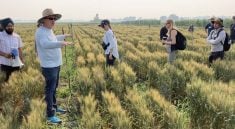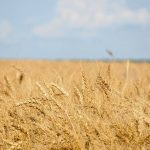KAP members voted to tell provincial and federal governments and the public that farmers can’t power their operations on biofuels and current energy sources.
“We’re very limited with the options that we have,” said Les Felsch, who brought the resolutions before KAP. “Windmills will not run grain dryers, solar panels will not run grain dryers at night. Those that think biofuels are an option, they should look at all the costs.”
Keystone Agricultural Producers held its annual general meeting in Winnipeg at the end of January.
Read Also

Farm trade policy pundits lay CUSMA odds
What’s the future of Canada’s free trade agreement with the U.S. and Mexico? Policy experts try to read the stars on the issue
“Natural gas should still be an option for us,” Felsch said.
The resolution, which KAP members approved, asked the organization to convey their concerns over biofuels and “current government policies.”
Concern over transitioning to biofuels like corn stover or straw likely comes from federal officials’ comments during committee hearings for Bill C-234, which if passed, would exempt natural gas and propane used to dry grain and heat barn from carbon pricing.
George Graham, who chairs KAP’s resolutions committee, pointed to an October Western Producer article, which quoted a Liberal MP who asserted that solar and geothermal technologies were used to heat and cool barns and greenhouses in his riding of Whitby, Ont.
Liberal MP Rechie Valdez (Mississauga-Streetsville) suggested biomass was the way forward, referencing Manitoba company Triple Green Products’ biomass-fueled grain dryer, the Western Producer said.
Grain industry representatives shot down these ideas, saying these ideas were not yet scalable or were expensive to adopt.
Marg Rempel, who seconded the resolution, said a key concern is that some producers don’t have short-term access to options. This isn’t to say a long-term strategy isn’t needed, she said, but the steps to get there seemed scant. That’s concerning for farmers planning investments in their operations, Rempel added.
Access to natural gas also entered the debate. Felsch expressed a belief that the province intended “that there will be no new natural gas lines in Manitoba.”
“As producers, we cannot live without new natural gas lines,” he said.
Reg Marginet, a KAP member and councillor with the RM of Victoria, said he wasn’t aware of a ban on new natural gas lines. However, in his experience, the province was reluctant to take on anything other than large-scale projects.
“It would need to be economically feasible to build new natural gas infrastructure,” a spokesperson for Manitoba Hydro said in a Feb. 2 emailed statement.
“We continue to invest in natural gas to ensure the reliability and safety of our system and to accommodate growth in areas where it’s already available or economically feasible.”
Natural gas will be part of Manitoba’s “fuel mix” for the foreseeable future, the spokesperson said.
Many farmers don’t have access to natural gas, Graham told the Co-operator. In some cases, natural gas infrastructure is in place but is already at or near capacity.
Graham said he has a natural gas line running under his property that feeds communities including Dauphin, Russel, Binscarth and others.
“It’s not a very big line, so they have told us there’s no chance for anybody along the pipeline to tie in,” he said.
Many farmers use propane to fuel grain dryers, he said.
Manitoba Hydro recently got approval to offer a modified version of its “Large General Service,” to accommodate grain drying, a Manitoba Hydro spokesperson said.
In the Jan. 4 public utilities board decision, the board approved an option in which farms could receive natural gas service only between April and the end of November. This would power grain drying during harvest, the decision said, but lock farmers out during peak demand in winter.
The move is touted to provide service to more farmers without overloading an already strained supply in winter.
The decision identifies Centra Gas’s south loop service to the Morden, Winkler and Carman region as an area of specific need.
“Centra is already planning to increase the capacity of the South Loop transmission system,” the decision said. “The required costs… are estimated to be in the millions of dollars and the project may take several years to complete.”
















